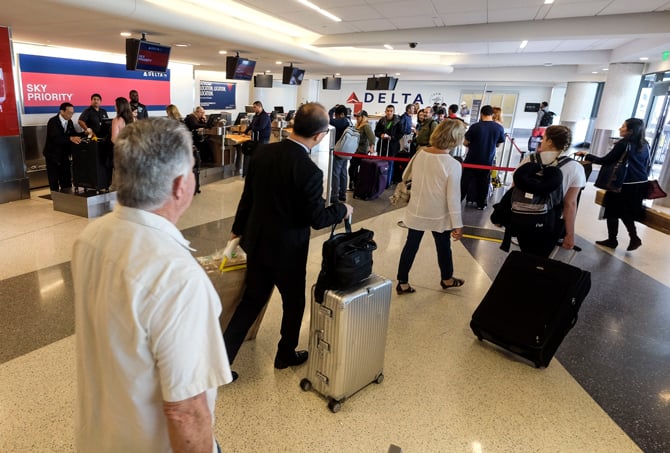Los Angeles International Airport is a step closer to receiving tens of millions of additional dollars each year in passenger fee revenues, just as its multibillion-dollar modernization program has kicked into full gear.
The U.S. Senate Appropriations Committee in July approved a proposal to nearly double the passenger facility charge to $8.50 per airline ticket from the current $4.50. The proposal is part of the annual budget for the Department of Transportation.
If approved by the full Senate and then the House and signed into law by President Donald Trump, this passenger facility charge hike would be the first in 17 years and would generate an additional $3.2 billion a year in funds for improvements at the nation’s airports. Roughly $130 million a year of this would go to LAX, on top of the $150 million it already receives annually, according to Los Angeles World Airports spokeswoman Becca Doten; over 10 years, that would amount to $1.3 billion in extra funding.
The airport is in the midst of building a $1.6 billion terminal on the airfield next to the Tom Bradley International Terminal and is embarking on a $5.5 billion plan for access improvements, including an automated people mover and a consolidated car rental facility. Most of these projects – with the exception of the car rental facility – are eligible to receive funds from the federal passenger facilities charge.
“At LAX, we have a pressing need to improve our infrastructure and better serve passengers at the largest origination and destination airport in the country,” Los Angeles World Airports Chief Executive Deborah Flint said in a statement after the vote. “LAX is excited that the Senate is considering this action in its current funding bill.”
But the nation’s major airlines oppose the hike in the passenger facilities charge; their Washington, D.C.-based trade group, Airlines for America, issued a statement before the vote calling the hike an unnecessary additional tax on consumers.
“Airline passengers already pay over $20 billion a year in taxes for the tickets they purchase. Adding another $3.2 billion tax hike on American travelers simply cannot be justified,” Airlines for America Chief Executive Nicholas E. Calio said in the statement.
Adult Film Fees
Adult film producers are mobilizing against a plan from Los Angeles County health officials to charge them nearly $1,700 to get a health permit and nearly $1,000 to renew the permit every two years after that.
Several adult film producers showed up at a July 25 Board of Supervisors hearing on the new fees. The board had been scheduled to take a vote immediately after the hearing, but upon receiving calls and testimony from the producers, decided to pull the item from the agenda at the last moment and put off a vote for at least a month to consult with stakeholders.
The operating and health inspection permits are required under Measure B, a 2012 measure approved by county voters that requires actors on adult film sets within the county to wear condoms. But the fee levels were not specified in the measure. Finally, after nearly five years, public health officials last week released their proposal for the permit fees: $1,672 for an initial adult film permit and $982 for biennial permit renewals.
“The permit fee considers staff salaries based on time spent on permitting activities, operating expenses, overhead … (and) time spent on complaint investigation,” Barbara Ferrer, director of the Public Health Department, said in a letter to the Board of Supervisors.
But adult film producers said the fees have no basis in reality and are unaffordable for most producers. They note that since passage of the condom measure, many of the major adult film studios have moved production outside the county – to neighboring Ventura County or to Las Vegas – leaving solo independent film producers responsible for about three-fourths of the adult film production in the county. Many of these independent producers upload videos through home-based webcams.
“When rent is due, there are many working-class people in L.A. County that turn on a webcam to make ends meet,” said Siouxsie Q, an independent producer who is also policy director for the Free Speech Coalition, a Canoga Park-based adult film industry advocacy group. “These fees may not seem like much to a big budget studio, but for the majority of workers, these fees would make compliance difficult.”
Besides, Q said, “Many of us are wondering, Why do I have to pay nearly $2,000 upfront and $1,000 more every two years to essentially take selfies on my phone?”
Curb Delay?
Los Angeles County Metropolitan Transportation Authority Chief Executive Phillip Washington sketched out a plan last month to launch an Uber-Lyft-like “curb-to-curb” minibus service using its drivers and vehicle fleet with private-sector companies operating the reservation platform. He told listeners on KPCC 89.3 FM that requests for proposals would go out very soon.
But MTA spokesman Jose Ubaldo said last week that while the agency is “investigating this as a possibility, there is nothing more now that we can say. We may have something more solid on this after the first of the year.”
Staff reporter Howard Fine can be reached at [email protected] or (323) 549-5225, ext. 227.

